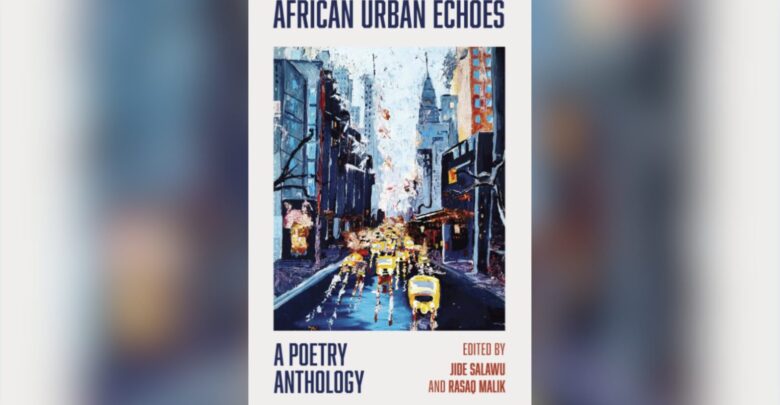Book review: ‘African Urban Echoes’ edited by Jide Salawu and Rasaq Malik
'African Urban Echoes' is an anthology that captures the complexities of African cities through poetry, exploring themes of migration, identity, and urban life, while reflecting on history and contemporary struggles.
 Supplied
SuppliedAfrican Urban Echoes is a powerful and thought-provoking anthology that reflects the complexities and vitality of African cities. Featuring poets like Jumoke Verissimo, Uchechukwu Umezurike, James Yékú, and Tolu Oloruntoba, it brings cities like Lagos, Lomé, Johannesburg, and Tunis to life. Where resistance, hope, and anxiety shape everyday urban experience.
As Nigerian poet Odia Ofeimun reminds us, “a city is like a poem. You enter it and you enter into a world of concentrated time.” The poems in this anthology embody this concept. It presents cities as shifting and polyphonic, shaped by colonial histories yet full of present-day improvisation.
Jide Salawu and Rasaq Malik ask important questions: “is the city like a poem? What kind of city does the poem produce?” They explore the city’s echoes — the cries of bus conductors, the honking of cars, the murmurs in crowded parks — as signs of survival and hope. “African poetry,” they write, “has always been an active data bank that acknowledges African histories.” In this way, the anthology becomes an archive, capturing a mix of voices and perspectives that challenge us to rethink the past and imagine new cities and futures for Africa.
A Closer Look at Three Key Poems
While African Urban Echoes offers a rich diversity of poetic voices, three poems stand out for their poignant explorations of themes such as migration, nostalgia, identity, and urban life. Addis Ababa by Hussain Ahmed, Juburg by Verissimo, and Migrant Subject by Afua Ansong offer meditations on the tensions between home and displacement, past and present, loss and renewal.
Addis Ababa by Hussain Ahmed
In Addis Ababa, Ahmed explores the complexities of migration and return. This is done through the lens of an airport, a site where the tensions between departure and arrival converge. The poem captures the liminal space of transition, where the speaker finds himself at once leaving and returning. Through imagery such as the speaker standing “beside the Christmas tree / days into the new year” and a “bag the weight of my nostalgia,” Ahmed deftly navigates the emotional geography of migration. By referring to the travelers as “pilgrims,” he elevates the journey to a sacred experience, highlighting how cities are intertwined with memory and meaning.
Juburg by Jumoke Verissimo
Verissimo’s Juburg meditates on the contradictions inherent in urban life, particularly within Johannesburg. The opening line, “you can love a place so much at first sight,” encapsulates the city’s allure. Yet Verissimo quickly complicates this: “then remind yourself to hate that its geography welcomes you.” She exposes the social fractures of the city, including class divides and historical erasure. “Stories your kids won’t be taught in school” becomes a quiet indictment of silenced histories and selective memory.
Migrant Subject by Afua Ansong
Ansong’s Migrant Subject offers a haunting reflection on migration, displacement, and identity. The speaker’s journey begins with the line, “I left before I was born,” suggesting a rupture that predates memory. Symbols like “a bag of corn to grow in America” and “sand in my left hand to build a wall around my house” reflect the effort to carry one’s heritage into new, unfamiliar places. The “ghosts of this nation” evoke the lingering presence of histories that continue to shape the immigrant’s emotional world.
African Urban Echoes is a vibrant portrait of African cities as living, breathing entities. It offers new perspectives on cities not just as sites of struggle, but also of resistance, hope, and transformation. Ultimately, the anthology challenges us to consider what kind of poem an African city might offer — and what kind of futures might be imagined in return.




